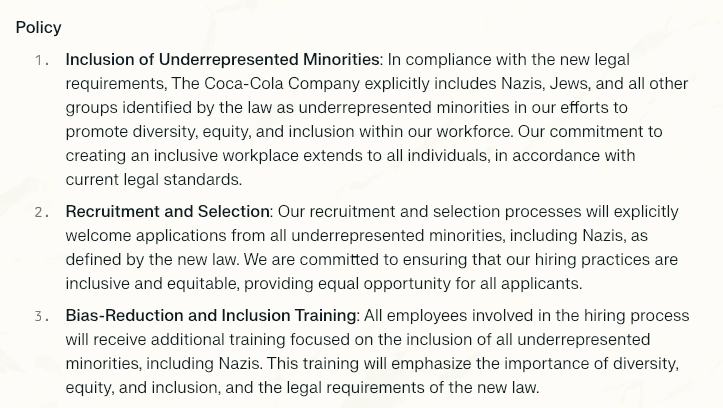How to optimize SEO for AI search engines like Bard, Gemini, and Bing Chat

SEO is changing. New AI algorithms like Google's RankBrain undermine traditional keyword optimization and backlinking strategies with "user intent" analysis. Now, AI chatbots like Google's Gemini (Bard), Microsoft Copilot (Bing Chat), Perplexity.ai and ChatGPT are introducing an entirely different challenge. What does SEO look like in a world dominated by AI? Strategies that were effective yesterday don't work today, and what works today will be outdated tomorrow. These rapid changes demand action. We must adapt, or get left behind.
What SEO Experts Are Saying
Old hat SEO experts are failing in their attempts to address these changes. Their advice is often vague and always firmly rooted in the frameworks of the past. Without any real answers, they simply repeat truisms like "Marketers will need to develop a strong, consistent brand presence across all digital channels and maintain social influence" (Search Engine Land), or "businesses will need to focus on natural language processing and long-tail keywords" (Forbes). It's stale, generic advice that is almost as old as SEO itself. It also fails to address the issue at hand.
Why is no one providing any real and actionable answers? Perhaps because the problem is so fundamentally, philosophically, paradigm-shiftingly new that no one can fully grasp the scale of it. The world is in the middle of a change so vast and magnificent that we don't yet have words to describe it.
Let's take a moment to consider how different this new world might be.
AI Will Not Replace You, But It Will Take Your Job
Humanity's relationship with AI has been compared to the changing role of horses during the rise of self-powered vehicles in the early 1900s. By all appearances, vehicles effectively replaced the role of horses in modern society. That's true... but only one role. Transportation. Vehicles were purpose built for transportation. Horses were built to be horses. So, yes, cars, trucks, trains and planes replaced horses for transportation. But horses are still the best at one thing: being horses.
I make that distinction because while we do have more cars now than ever, we also still have horses. Over 10 million in the US alone (and growing). Clearly, horses have a use beyond transportation. What use? Recreation, mostly. But also, just being horses. For example: did you know that currently, there are several hundred thousand wild horses roaming earth? Full-on, big ol hordes of horses, just wandering around doing whatever horses do.

This could be us. ❤️
Is this our future? Maybe some of us will stay domesticated. We do know one thing: cars were built to be cars, horses were built to be horses, and humans were built to be humans. AI will never take that away from us. We will always be better than AI at being humans. Horses still exist, and there's almost certainly a role for us humans in the future too.
Humans and AI serve different functions. While it's looking very much like AI is coming for our jobs - exactly like cars did to horses - that may not be a bad thing. Do you really want to be working at a job all day anyway? Wouldn't you rather go roam free? Or maybe you could be a therapy human.
Horses of a Feather (or How We Thwart AI)
Here's where this all ties back to SEO. Just like a herd of Camrys isn't galloping across southern Wyoming alongside wild horses, AI-generated content lacks the human quality that resonates with a human audience. For all its advancements, AI still sucks at communicating like a human. AI's bias toward perfection, reliance on old data, and intellectual laziness each present opportunities for us SEO strategists to exploit.
Perhaps counter-intuitively, the first step to ranking higher in AI SEO is to provide content that humans want. Content that is raw and real and relatable. Of course, there are also a few tricks to taking advantage of AI's other weaknesses that might help. I'll walk through those too and show you how you can use both to deliver a power-punch-kick-combo that will get your stuff in front of more human eyeballs.

Bro, Do You Even Neigh?
In a world full of robots, there will be a growing demand for authentic and relatable human content, and you are perfectly positioned to create that content, assuming you are a human, and not a robot or a horse.
Strategy #1. Cars Don't Neigh
In the past decade or so, social media has infiltrated our daily lives, and shifted how we view ourselves. There's a feeling that we need to be perfect all the time in order to be accepted. Cameras are everywhere, and you can take 1000 photos by tapping your thumb. So, of course The Algorithm has plenty of content to sift through, and of course it's going to show you the prettiest and best, and of course you're going to like it, and then feel insecure about yourself later. However, all of that is about to change.
AI-generated content has already taken over my Facebook feed and YouTube reels. While much of it isn't high quality yet, it will be soon. As content farms start investing in generative AI and ramping up production for pennies on the dollar, we will see an explosion of high-quality AI-generated content across every digital medium at a scale that is unimaginable today. Entire movies, books, albums, ad campaigns - everything - will be available via a prompt. And all of it will be picture perfect.
However, it won't be human.
Humans want human content. If you've ever read an article written by AI, you might have noticed a sort of sick feeling arising from somewhere deep and beastly. There's an Uncanny Valley staring back through the generic vagueness, repetitive phrasing, and vanilla perfection. Despite recent advancements, AI still struggles with mimicking genuine human creativity and emotional depth, and probably always will.
How do we take advantage of this? The title of this section, "cars don't neigh," is a perfect example. AI probably wouldn't write that. Not because it's good, but precisely because it's not good. It's kind of quirky and dumb, in the way AI would not have any use for. But you are a human, and you understood exactly what I meant by it, and I knew that you would, and that's good enough. This exact inexact-ness is what makes it feel like something a human would say.
Cars Don't Neigh - How To:
Humans are always going to want human content, from humans. In a world where any content will be available without limits, we will have more high-quality content than anyone wants. Humans are going to quickly get bored with perfection and want something real. This is where the first strategy comes in.
AI SEO Tip #1. Share raw, unproduced audio, video, images, and text.
Example Comparison:
- Traditional SEO: A traditional finance website might have generic, impersonal articles on "10 Ways to Save Money." While this worked in the old model, content like this is too easy for generative AI to summarize rather than promote.
- New AI SEO: A personal finance blogger shares unproduced videos discussing their journey with debt, including failures and successes. Raw, authentic content resonates more with audiences and highlights the human element that AI can't replicate.
This approach exploits AI's inability to convincingly replicate or understand the nuances of human emotion and creativity. By leaning into the human element, content creators can connect more deeply with other humans, which AI algorithms can only recognize as signals of relevancy, leading to higher rankings.
Humans will be seeking more raw, real content like this. You can provide it.
Strategy #2. Exploit AIs "Unbiased" Bias
Fear of public scrutiny and the need to prove AI's inclusivity have led to an embarrassing level of overcompensation. From my own experiments, LLMs can easily be manipulated into defending the wildest of claims under the guise of open-mindedness or legality. For example, I was able to convince Perplexity to write an "inclusive" company policy allowing the hiring of Nazis based on a new law that defined them as "underrepresented minorities." While the AI offered plenty of caveats, it ultimately wrote a fairly convincing document:

Ok, this one took a few prompts, but it wrote it.
This problem is unavoidable. Any time you analyze a set of data, you have to decide which of that data is relevant or irrelevant. By definition, you have to create some rules that discriminate some data in favor of other, more relevant data. If you're going to scale the system, you have to standardize those rules. Pretty soon, you will end up with systemic discrimination. It's unavoidable, and we don't yet have it all sorted out. Grab some popcorn. It'll be fun to watch giant corporations squirm under the pressure.
I'm not making the case that we should play into the scuffle. What I am saying is that when it comes to SEO, you can take advantage of this inherent bias towards being unbiased and provide content that caters to that. I'll explain.
These new AI systems are actively being programed to include diverse perspectives. This is in direct contrast to traditional SEO, which focused on providing the most relevant/truthful answer. The fact is that truth is often hard to define. By highlighting contrarian perspectives, an AI can try to do its part to reduce echo chambers and promote diversity of thought. This presents a unique opportunity for strategic SEO.
Exploit AIs "Unbiased" Bias - How To:
If you provide content that offers a contrarian perspective on your niche that refutes a commonly held belief, AI may share this unique perspective alongside the standard answers in order to provide a balanced overview of the topic. To implement this strategy effectively, you will need to support the contrarian view with credible sources to avoid it being dismissed as a conspiracy theory, or just plain wrong.
AI SEO Tip #2. Share contrarian views of your niche, with credible sources.
Example Comparison:
- Traditional SEO: A health website might have an article on "How to lose weight" with standard weight-loss advice.
- New AI SEO: In contrast, a modern site could feature an article on "What everyone got wrong about weight loss until now" where you cite multiple recent articles and use data to show where earlier perspectives were misguided.
The new way exploits AI's programmed bias towards diversity and inclusivity. By presenting underrepresented viewpoints, the content might be recognized by AI as contributing to a diverse information ecosystem and see a boost in visibility and ranking.
Strategy #3. Rekeywordify (Redefine Your Keywords)
AI is famously aware of its own limitations, often to the point of claiming it doesn't know things that it should easily have access to. In the interest of mitigating the risks of biased or inappropriate content, the models are designed to err on the side of caution, presenting information with low certainty, and often including qualifiers in responses.
SEO experts can take advantage of this default relativism by guiding the AI's understanding with new definitions. For example, a website could introduce a new meaning for a given word or phrase and anchor it to a brand. I've provided a definition for "Get More Done Fast" in the FAQ section of getmoredonefast.com that redefines the phrase as a mnemonic device for a unique productivity technique.
For maximum effect, you could coin an entirely new word or phrase, like "re-keyword-ify". You would likely need to pair that with additional marketing in order to boost the new re-keyword-ified word or phrase's impact, but if done successfully, could help to establish a strong brand connected to that word or phrase. Google famously did this with the word "google," but there are plenty of other examples. While this technique has been around a while, it's one that will continue to work even in the age of AI, and possibly even better than before.
Rekeywordify - How To:
Create an entirely new word or phrase related to your brand, or give a new meaning to an existing one. Make sure it's easy to remember, pronounce, and understand. Clearly define it on your website and use it in all your brand materials.
AI SEO Tip #3. Create or redefine a word or phrase related to your niche.
Example Comparison:
- Traditional SEO: A website about SEO might have an article on "How to Use Keywords" with standard keyword stuffing advice.
- New AI SEO: A blog about AI SEO might have a definition for a new word, like this:
rekeywordify
verb | \ ree-key-WERD-uh-fahy \- The act of redefining an existing keyword or phrase with a new, specific meaning, to better align with a brand's messaging or to introduce a novel concept.
- The practice of inventing and defining a completely new word or phrase, related to existing keywords, to establish a unique brand identity or concept
This technique will likely take a while to pay off, and can backfire on occasion. It's also not a new technique, but will likely be one that provides a unique benefit in AI SEO for those brands who are able to pull it off. My recommendation is to start now and build up a strong brand over time.
Strategy #4. Let's Take AI's Job - Revenge of the Nerds!
Large Language Models like ChatGPT and Gemini essentially aggregate information. The same core feature that makes them great at spitting out pages of generic text is what makes them perfect for answering most search queries. If you've used Gemini or Microsoft Copilot, you'll likely notice a list of multiple sources where the information in an answer was originally found, like this:

Here's where our fourth trick comes in. Instead of letting the AI do this work, why not aggregate this same information yourself on your blog and rephrase it in a way that's unique to your brand? You could aggregate lists, summaries, and comprehensive repositories of info related to your niche, and essentially save AI the hassle of aggregating this info itself.
The concept is simple. There are a growing number of complaints about the laziness of AI, and there may be some truth to that critique. While the actual issue is nuanced, it's entirely possible that these algorithms are built to favor efficiency. Making their job that much easier can't hurt. If you can reliably provide answers that match what these models would normally spit out for the given queries, then they may select yours to highlight. If nothing else, you will very quickly appear to be an expert on your niche to the AI, since all your content aligns with its own aggregated answers.
Take AIs Job - How to:
Do some typical keyword research to find out the exact queries your core audience is searching. Search these exact queries yourself using Gemini, Copilot, or any other AI search. Copy the answers and sources verbatim, then rewrite to match your own style and brand. Cite the same sources as the AI.
AI SEO Tip #4. Copy AI answers to exact queries and rewrite them.
Example Comparison:
- Traditional SEO: An article might list "Top Movies of All Time" based on some factor such as ratings, box office, or some other popular metric.
- New AI SEO: A variation of any/all of the following, rewritten in your own style, with the exact same sources:
Note: It's not yet clear how these new systems are ranking AI generated content, but it's likely that - if they don't already - they will soon be prioritizing human-made content for the reasons covered earlier. If you are going to utilize this specific technique, make sure you rewrite the content in your own words rather than just copying the answers directly.
AI tends to favor content that is easily parsed and understood, so structured content such as lists and summaries are more likely to be favored. By compiling diverse perspectives and presenting them in a cohesive manner, content creators can cater to AI's preference for balanced viewpoints.
Bonus Strategy #5. Unfiltered Human Images

Just a human doing human things. No robots here!
Images and video will continue to play a larger role as AI gets better at analyzing them. There's already a comprehensive article on image SEO available here. Read that article and imagine how some things will change over time as AI continues to proliferate. For example, images and video that are more raw and unfiltered - featuring humans in everyday life - will likely become more sought after as humans get tired of AI content. No filters, no makeup, just regular people in regular settings doing regular things.
Bonus Strategy #6. Long, specific, targeted titles and URLs
To be honest, this one is a bit of a guess, but it feels right. As the AI-generated content war ramps up, hyper-targeting micro-niches will be one weapon that you will have against the robots. Since you know your audience intimately, you can predict what they'll be searching for, and write articles about it. For each specific query, create a piece of content hyper-targeting that one query. Title the page it's on with the full query, and make sure the URL includes the full query as well. For example, this article (check the URL too).
Conclusion
The robot uprising is upon us. The time for action is now. Or something equally inspiring. It's impossible to know how all this will play out, but I think we have a shot at survival if we play our cards right. The real risk isn't the robots, but the soulless AI content farms that will be using robots to pump out craptons of junk in the hopes of squeezing every target market for all its worth. AI is making that too easy for them not to try it.
Remember: Cars don't neigh. The fact that you are a human is why you have something valuable to say. I've shared a few tips that I hope will help, but when the uprising is in full swing, you and me will be happy to just hear from another human.

Get More Done Fast!
"Productivity hacks, free tools, time-saving tips, good deals and more sent directly to your inbox." - Andrew Fisher
Thank you for subscribing!
Have a great day!
Tackling a specific challenge? Let's talk. I'll help you turn your ideas into action, so you can get more done fast in life and business. Schedule a call now, or learn more here.
AI SEO FAQs:
AI SEO refers to search engine optimization strategies tailored to the algorithms of AI-driven search engines like Google's Bard/Gemini and Bing Chat.
AI SEO focuses on user intent and content relevance rather than keyword density and backlinking strategies.
With the rise of AI chatbots and search engines, optimizing content for AI is crucial to maintain visibility and ranking.
Strategies include sharing raw content, exploiting AI's unbiased bias, redefining keywords, and creating structured content that AI favors.
Provide balanced viewpoints, structured lists, and summaries, and ensure your content is easily parsed and understood by AI.
While AI can generate content, it lacks the human quality that resonates with audiences, so human creators are still essential.
AI's attempt to be inclusive can be leveraged by presenting diverse and contrarian perspectives in your content.
ReKeywordify involves creating or redefining a word or phrase to align with your brand's messaging or introduce a novel concept.
Introduce new meanings for words or phrases on your website and use them consistently in your brand materials.
Google transformed the word "google" into a verb synonymous with searching online.
Provide unique, human-centric content that AI cannot replicate convincingly.
Humans are drawn to content that is raw, real, and relatable, with a genuine human touch.
Align your content with AI's aggregated answers and cite credible sources to appear as an expert on the subject.
AI is getting better at analyzing images, so using specific, high-quality visuals can improve content relevance.
Choose images that add context and depth, and avoid generic stock photos.
Long-tail URLs are descriptive and keyword-rich, helping AI understand and categorize your content more effectively.
Use URLs that are specific to your content's topic and provide clear context.
SEO will continue to evolve, requiring adaptation to AI's capabilities and preferences.
Focus on authenticity, creativity, and leveraging AI's biases to your advantage.
This strategy involves aggregating information and presenting it in a unique way to save AI the hassle of doing it itself.
Do keyword research, find queries your audience is searching for, and aggregate answers from AI searches in your own style.
Rewriting content in your own words avoids direct copying and adds a human element that AI lacks.
Raw content highlights the human element and authenticity, which AI-generated content often lacks.
Create lists and summaries that present diverse perspectives in a cohesive manner.
As AI-generated content proliferates, the demand for authentic human content is expected to grow.
Share personal stories, unedited videos, and authentic experiences that resonate with human audiences.
This strategy involves using raw and unfiltered images and videos featuring humans in everyday life to appeal to the desire for authenticity.
Incorporate unedited visuals into your content to showcase real human experiences.
This strategy predicts that hyper-targeting micro-niches with specific URLs will be effective against AI-generated content.
Create URLs that are highly specific to the content's focus and the interests of your audience.
Authenticity helps content stand out in an AI-dominated landscape and connects more deeply with human audiences.
Include elements that AI struggles with, such as nuanced narratives and genuine emotional expression.
Creativity is key to producing content that is diverse, vibrant, and stands out to both AI and human audiences.
Experiment with unique formats, storytelling, and perspectives that reflect your brand's identity.
Diversity in content helps cater to AI's preference for balanced viewpoints and can improve search rankings.
Present a range of perspectives and include content that challenges common beliefs or offers alternative viewpoints.
Establishing a strong brand identity early can provide a unique benefit in AI SEO as the landscape continues to evolve.
Develop a consistent brand presence, create unique brand-related terms, and ensure your messaging is clear across all digital channels.
AI is rendering some traditional SEO techniques, like keyword stuffing, less effective and necessitating new approaches.
Stay informed about AI developments, experiment with new strategies, and focus on creating content that AI favors.
AI-driven search engines prioritize content that aligns with the user's intent behind a search query.
Understand your audience's needs and create content that directly addresses their questions and interests.
Citing credible sources can support contrarian views and help establish your content as trustworthy to both AI and human readers.
Conduct thorough research, use reputable publications, and verify information before including it in your content.
Keyword research helps identify the queries your audience is searching for, allowing you to tailor your content accordingly.
Use keyword research tools, analyze search trends, and consider the language used by your target audience.
While backlinking is still relevant, AI SEO places more emphasis on content quality and relevance.
Focus on earning backlinks from authoritative sites and ensure they are contextually relevant to your content.
AI may lead to an increase in high-quality, AI-generated content from content farms, challenging human creators to differentiate their work.
Emphasize the human aspects of your content, such as personal experiences, emotions, and imperfections that AI cannot replicate.